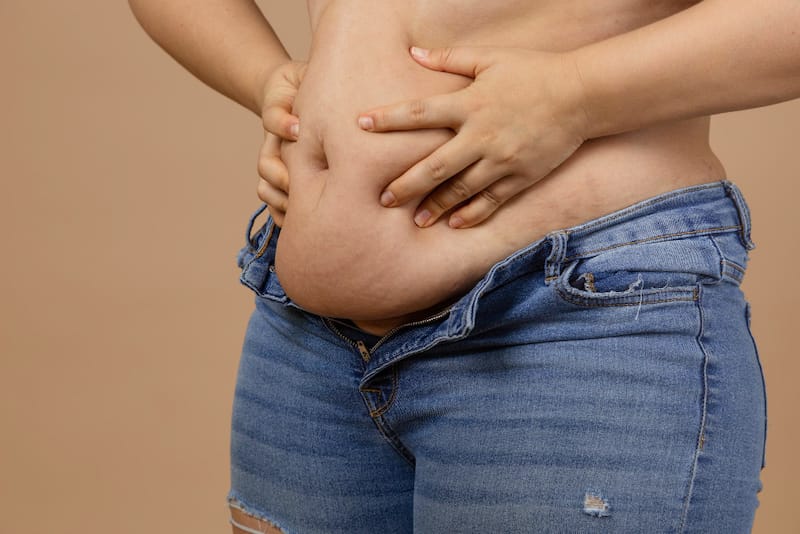Your stomach looks bigger after gallbladder removal surgery for several reasons. The gas pumped into your abdomen during laparoscopic surgery could be one reason. In addition, post-recovery bloating, changes in the digestive process, and inflammation can make your stomach look more prominent after gallbladder removal surgery.
If you keep suffering from gallstones, your doctor may suggest that you do a cholecystectomy which means the removal of your gallbladder.
Hard deposits of bile form gallstones in your gallbladder and can be as small as a pebble and even as large as a golf ball. The gallstones cause a lot of pain and discomfort.
The only helpful way to deal with gallstones involves the removal of the gallbladder since, if left in place, and the gallstones will keep reoccurring endlessly.
Even though the gallbladder is removed, bile production continues and drips into the gut through the bile duct, thus helping with digestion as it should.
However, the amount produced may not match the one produced when there is a gallbladder.
Removing the gallbladder or cholecystectomy is a solemn procedure that can be done through open or laparoscopic surgery.
Each technique differs from the other hence the post-surgery recovery may also differ.
Most people find out that after gallbladder removal, their stomach becomes bigger after surgery or recovery.
That enlargement of the stomach can be caused by many things, like the process of laparoscopic surgery.
Again after recovery, the digestive system may find it hard to digest fats, leading to bloating.
Bloating may make your stomach look larger and cause a lot of discomfort. Therefore there are steps you can take to reduce such.
Your body may change how it processes nutrients in your system leading to weight gain, which can accumulate around the stomach, making it look larger.
Inflammation can also make your stomach look big.
Here are the four main reasons your stomach may look larger after gallbladder removal surgery.
4 reasons your stomach may look larger after gallbladder removal surgery
1. Gas used in laparoscopic surgery
Unlike open surgery, where a big incision is made to expose the organ being operated on, the laparoscopic technique involves small incisions in the abdomen.
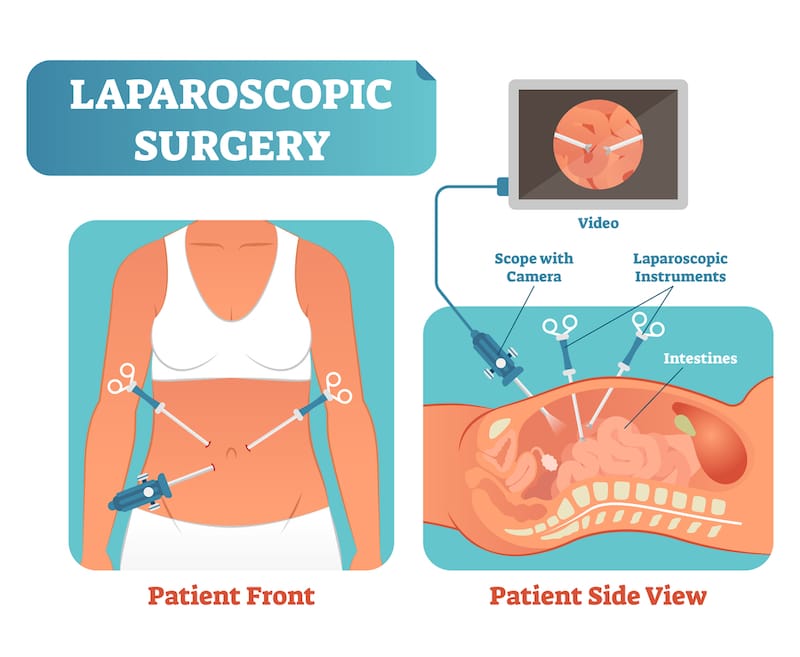
Tubes known as trochars go into these incisions, and with the help of an internal camera and a large screen, the doctor uses the trochars to cut into tissue and sew.
Laparoscopic surgery makes post-surgery recovery easier since there is less cutting and minor bleeding than in open surgery.
Even so, it would be challenging to locate and operate on an organ in the interior of the abdomen if it’s so squeezed up in there. The organs can be so close-packed that they could cause an accident.
Therefore surgeons pump air into the abdomen to increase space and help them see the gallbladder easier.
That means if you just had laparoscopic surgery to remove your gallbladder and your stomach looks bigger, it could be the gas that was pumped into your abdomen and did not completely drain out.
Over time the gas completely drains out, and your stomach size returns to normal.
2. Post-recovery bloating
After the surgery, you’re going to experience some mild swelling and bloating.
This is normal because, during the procedure, surgical gas is used to fill the stomach cavity to make it large so the surgeon can perform your surgery.
A lot of gas is removed from the stomach, but some air might remain inside. So a person might feel bloated and uncomfortable for a temporary time.
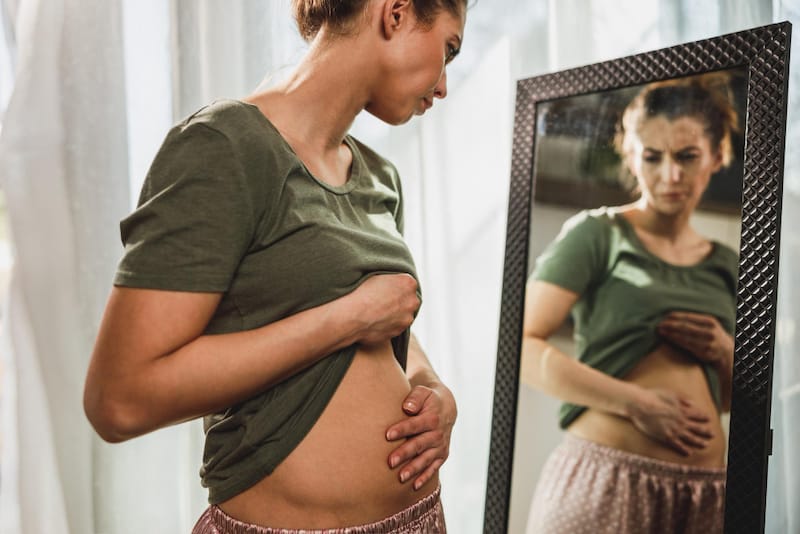
Naturally, the bile stored in the gallbladder is used to break down fats into fatty acids.
When the gallbladder is removed, the amount of bile that drips directly into the gut from the bile duct may be less due to lack of storage.
That would mean the digestion of fats may not happen entirely due to small amounts of bile. That causes a lot of bloating.
A lot of air may back up in your gut, making you feel uncomfortable and disoriented.
To ease such bloating, you can do some small body exercises or use medications specified for such purposes.
Some people have had to make some lifestyle changes post-cholecystectomy recovery to avoid these cases of bloating and flatulence.
Those changes may include easing up on fatty and greasy foods. Others use natural remedies like ginger.
You may also want to try daily exercise routines and foods rich in vegetables and fiber to ease digestion.
3. Changes in nutrient assimilation post recovery
After gallbladder removal, the digestive process may differ from before.
That could result in an alteration and confusion on how the body absorbs and stores certain nutrients, such as the fats that are supposed to be digested by bile.
Due to such changes in digestive and assimilation processes, most people tend to gain weight fast after gallbladder removal.
That extra body is stored in the tissue surrounding your stomach resulting in a protruding pot belly.
So the enlarging of your stomach might be an accumulation of fat deposits.
Such weight may be dangerous and result in other health complications in the future, so you must endeavor to keep your health in check throw low-fat diets and regular body exercise.
4. Inflammation
Some people may experience inflammation after gallbladder removal surgery.
Such inflammations may be caused due to exposure to an infection either during or after surgery.
Other underlying health conditions can also cause inflammation.
Inflammation in the interior of your abdomen can easily make your stomach look bigger than it should.
The inflammation is on its own, but it is always wise to seek immediate medical help.
Possible complications post gallbladder removal surgery
Surgery in itself does carry a little bit of risk and complications. It’s better to be aware of these complications.
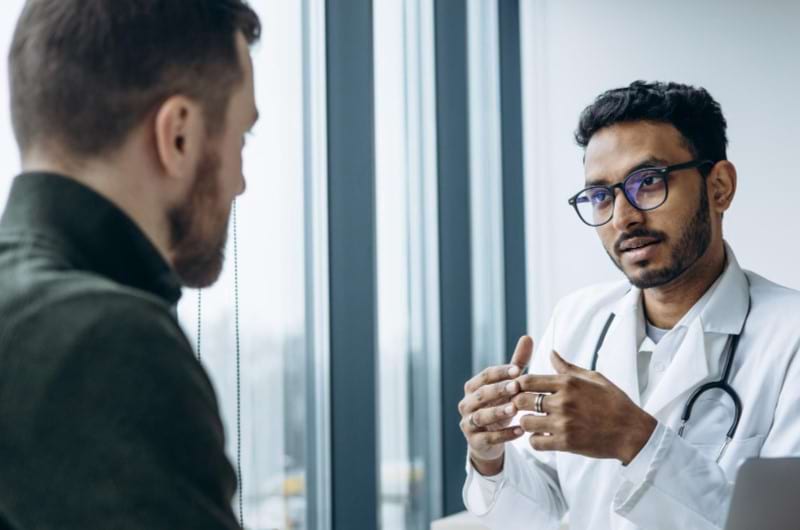
1. Infection
There might be a risk of developing an infection, such as a wound or internal infection, after the surgery.
Signs of the infection include increased pain, swelling or redness, and pus leaking from a wound.
You might need to see an expert if you develop these signs and symptoms, as you might need proper medication.
2. Bleeding
There might be a slight chance of bleeding after your operation though rare, but there’s still a possibility that you need to consider.
3. Bile leakage
When the gallbladder removal surgery is done, special clips seal the tube connecting the gallbladder to the main bile duct.
But the bile fluid can occasionally leak out into the abdomen. This can be noticed by symptoms such as tummy pain, feeling sick, a fever, and a swollen tummy.
This fluid can be drained off, but sometimes an operation is required to drain the bile and wash out the inside of your tummy.
Bile leakage occurs in around 1% of cases.
4. Injury to the bile duct
There’s a chance of the bile duct also getting damaged during the surgery. If that occurs during the surgery, it can be repaired immediately.
However, further surgery might be needed after the original operation.
5. Injury to the intestine, bowel, and blood vessels
Surgical instruments used during the surgery might injure surrounding structures such as the intestine, bowel, and blood vessels.
This injury is rare and can be repaired during the time of the surgery.
Sometimes injuries might be noticed afterward and might require surgery then.
6. Deep vein thrombosis
Some people might be at higher risk of blood clots developing after surgery, known as deep vein thrombosis (DVT), which usually occurs in a leg vein.
This clot can travel around the body and block blood flow into the lungs, causing something known as a pulmonary embolism.
If this occurs, you’ll be recommended to wear special compression stockings to wear after the operation to prevent this from happening.
7. General anesthetic risk
There could also be risks with a general anesthetic, but it’s quite rare.
Such complications include allergic reactions and death. If you maintain your health and fitness with the operation, then it reduces any such risks.
Tips to avoid digestive discomfort post gallbladder removal
1. Introduce food slowly
After gallbladder removal surgery, you can’t jump into the lifestyle you were used to. While eating delicious spicy, and flavorful food could be tempting, you must think carefully.
Give some time to your body to adjust as doctors recommend strictly limiting your diet to easily digestible food.
Such types of foods include broths, clear liquids, and gelatin.
2. Eat smaller portions
Forget your three or two-meals-a-day rule and focus on eating smaller portions every few hours.
This is the best you can do for your digestive system as you don’t overconsume and allow time to digest smaller portions.
Avoid foods with strong odors to avoid gas and spicy or fried items that could be harder to digest.
3. Low-fat diet
Focus on eating low-fat foods, as high-fat foods can trigger bloating, pain, and diarrhea after the surgery.
The focus should be on not exceeding 30% of your caloric intake. So be mindful of what you’re putting in your plate.
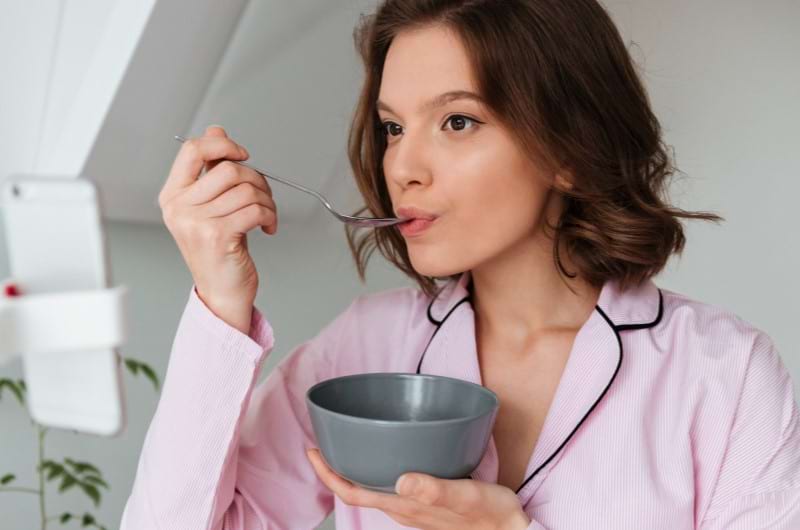
4. Reduce high-fiber food intake
What you need to avoid is foods such as:
- Fried food such as french fries, potato chips, and others.
- Fatty food
- Processed food
- Pizza
- Whole-fat cheeses, ice cream, and milk
- Lard and butter
- Cream soups and sauces
- Coconut and palm oil
You can’t allow yourself to include all these kinds of food in your diet all at once.
However, you can gradually reintroduce them back into your diet. Too much fiber can increase cramping and gas.
5. A food journal
Maintain a food journal where you can track your food items and be aware of what you ate and when.
It’s easier this way as you literally write down what you eat, so you’re self-aware too.
It will prevent causing any kind of discomfort.
Keep your doctor in the loop, and don’t hesitate to discuss your food options and any kind of weird signs or symptoms you notice. It’s better to seek expert advice than do whatever you think is right for you.
FAQs
What helps in reducing bloating after gallbladder surgery?
After gallbladder surgery, resultant bloating is eased through reducing fatty foods, engaging in daily bodily exercise routines, and eating foods rich in vegetables and fiber.
How long does your stomach stay swollen after gallbladder surgery?
You might feel bloated or swollen for a week. You’ll gradually pass gas and start to feel better.
However, your food intake also plays a significant role in reducing bloating and swelling.
Pay attention to what you eat and follow your doctor’s advice.
Why am I gaining so much weight after gallbladder surgery?
Your body changes and has to adapt to the new change after the surgery. Sometimes you could end up gaining weight as well as it’s unable to digest fat and sugar productively.
Is it possible to lose weight after gallbladder removal?
You should try to reduce weight but in a healthy way. This takes time, but if you want a quick remedy by reducing your diet, then it’s going to harm your health.
Why do I have stomach issues a year after gallbladder removal?
Sometimes post-cholecystectomy syndrome can present early but can also appear months and even years after the surgery.
The symptoms include fatty food tolerance, nausea, vomiting, heartburn, flatulence, indigestion, diarrhea, jaundice, and intermittent episodes of abdominal pain.
Conclusion
After gallbladder removal surgery, it would be advisable to make appropriate changes in your lifestyle.
Such changes would not only help your stomach remain at its standard size but will also improve your health altogether.
The lifestyle changes include daily exercise, low-fat diets, and a lot of vegetables, fruits, and fiber-rich foods.
Again if the enlargement seems weird, unnatural, or excessive, you may seek help from a doctor or therapist.
References
- https://www.mayoclinic.org/diseases-conditions/gallstones/symptoms-causes/syc-20354214#:~:text=Gallstones%20are%20hardened%20deposits%20of%20digestive%20fluid%20that%20can%20form,released%20into%20your%20small%20intestine.
- https://medlineplus.gov/ency/presentations/100166_1.htm#:~:text=Laparoscopic%20surgery%20is%20a%20surgical,%2C%20cut%2C%20and%20sew%20tissue.
- https://www.ncbi.nlm.nih.gov/books/NBK539902/#:~:text=The%20symptoms%20include%20fatty%20food,months%20to%20years%20after%20surgery.
- https://www.verywellhealth.com/gallbladder-surgery-long-term-care-5024905
- https://www.healthline.com/health/ibs-after-gallbladder-removal

